Nursing Assignment: Caring, Theories, Ethical Issues, and Practice
VerifiedAdded on 2021/10/04
|7
|1485
|80
Essay
AI Summary
This nursing assignment explores the concept of caring in the healthcare profession, tracing its historical evolution from Florence Nightingale's emphasis on caring to its contemporary understanding. The assignment delves into various nursing theories, including critical and complexity theories, analyzing their application and implications in clinical practice. It examines ethical issues related to nursing, such as breaches of professional standards and patient rights, and discusses controversies surrounding the application of caring theories. The assignment concludes by identifying an ontological tradition, specifically the critical nursing theory, as a guiding framework for the student's future nursing practice, emphasizing the importance of understanding socio-cultural contexts and addressing health inequalities. References to key literature are also included.
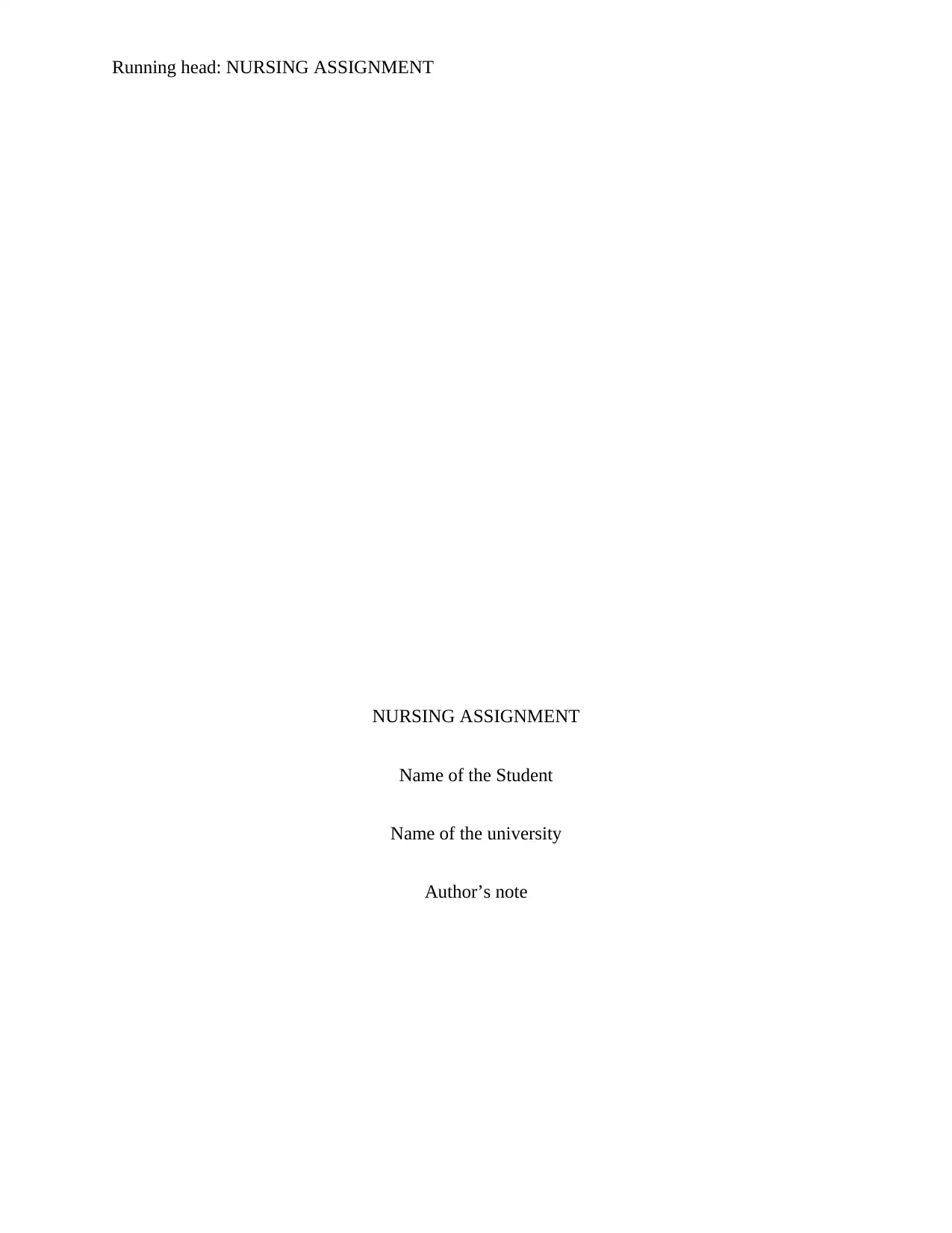
Running head: NURSING ASSIGNMENT
NURSING ASSIGNMENT
Name of the Student
Name of the university
Author’s note
NURSING ASSIGNMENT
Name of the Student
Name of the university
Author’s note
Paraphrase This Document
Need a fresh take? Get an instant paraphrase of this document with our AI Paraphraser
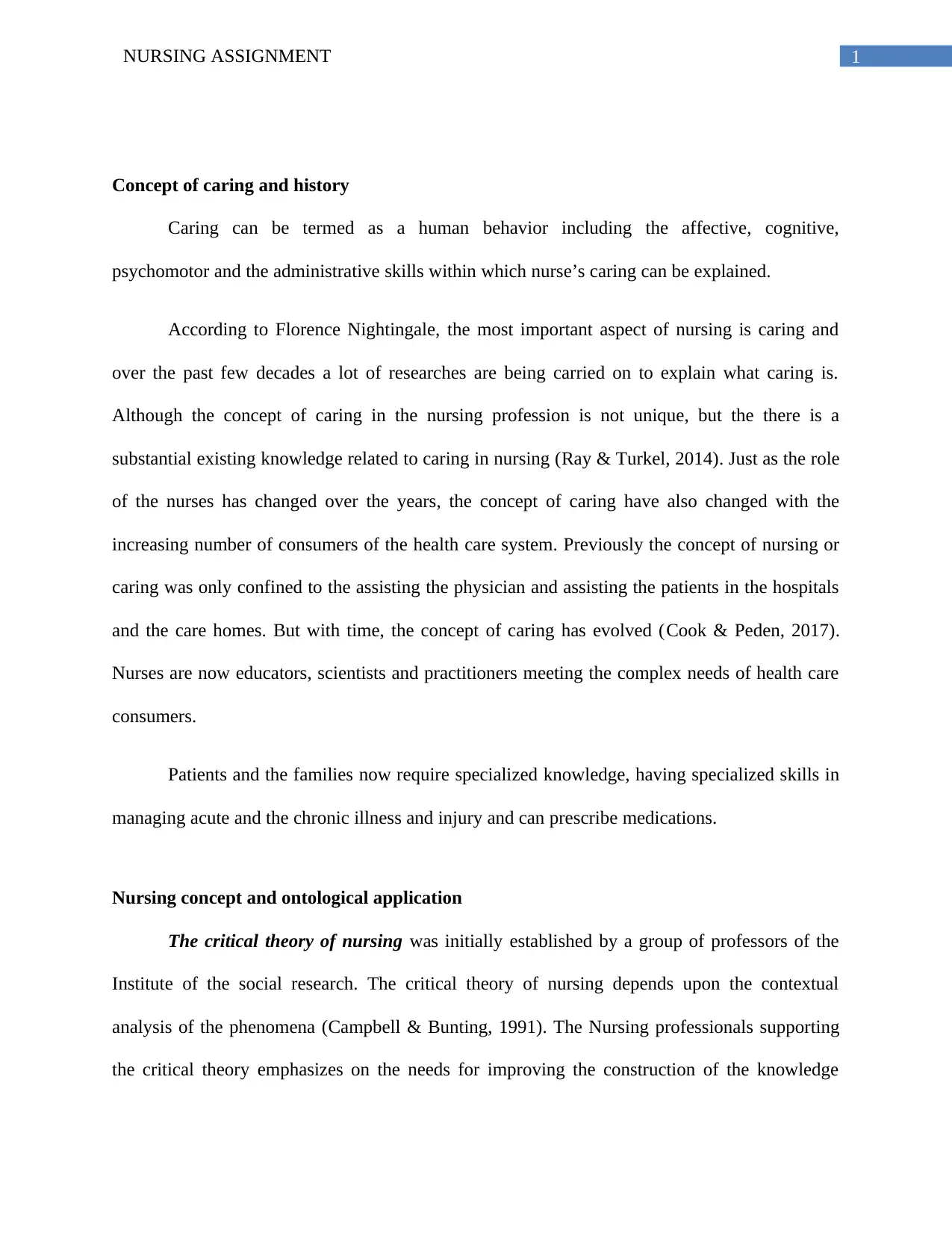
1NURSING ASSIGNMENT
Concept of caring and history
Caring can be termed as a human behavior including the affective, cognitive,
psychomotor and the administrative skills within which nurse’s caring can be explained.
According to Florence Nightingale, the most important aspect of nursing is caring and
over the past few decades a lot of researches are being carried on to explain what caring is.
Although the concept of caring in the nursing profession is not unique, but the there is a
substantial existing knowledge related to caring in nursing (Ray & Turkel, 2014). Just as the role
of the nurses has changed over the years, the concept of caring have also changed with the
increasing number of consumers of the health care system. Previously the concept of nursing or
caring was only confined to the assisting the physician and assisting the patients in the hospitals
and the care homes. But with time, the concept of caring has evolved (Cook & Peden, 2017).
Nurses are now educators, scientists and practitioners meeting the complex needs of health care
consumers.
Patients and the families now require specialized knowledge, having specialized skills in
managing acute and the chronic illness and injury and can prescribe medications.
Nursing concept and ontological application
The critical theory of nursing was initially established by a group of professors of the
Institute of the social research. The critical theory of nursing depends upon the contextual
analysis of the phenomena (Campbell & Bunting, 1991). The Nursing professionals supporting
the critical theory emphasizes on the needs for improving the construction of the knowledge
Concept of caring and history
Caring can be termed as a human behavior including the affective, cognitive,
psychomotor and the administrative skills within which nurse’s caring can be explained.
According to Florence Nightingale, the most important aspect of nursing is caring and
over the past few decades a lot of researches are being carried on to explain what caring is.
Although the concept of caring in the nursing profession is not unique, but the there is a
substantial existing knowledge related to caring in nursing (Ray & Turkel, 2014). Just as the role
of the nurses has changed over the years, the concept of caring have also changed with the
increasing number of consumers of the health care system. Previously the concept of nursing or
caring was only confined to the assisting the physician and assisting the patients in the hospitals
and the care homes. But with time, the concept of caring has evolved (Cook & Peden, 2017).
Nurses are now educators, scientists and practitioners meeting the complex needs of health care
consumers.
Patients and the families now require specialized knowledge, having specialized skills in
managing acute and the chronic illness and injury and can prescribe medications.
Nursing concept and ontological application
The critical theory of nursing was initially established by a group of professors of the
Institute of the social research. The critical theory of nursing depends upon the contextual
analysis of the phenomena (Campbell & Bunting, 1991). The Nursing professionals supporting
the critical theory emphasizes on the needs for improving the construction of the knowledge

2NURSING ASSIGNMENT
consisting of a liberating purpose and emancipating purpose. The critical theory in the nursing
concept implies that, once the theory has been imparted it should be put into practice for
accomplishing enhanced learning from the feedback. As per this theory the nurses should be able
to push their limits, leaving behind the technical, conventional, pathocentric, submissive
professional exercise. This dialectic vision of the health care science is in contradiction with the
concept of health (Mosqueda-Díaz et al., 2013). The concept of critical theory emphasis on the
nurses for considering the facets of the socio-cultural context while offering care to the patients,
that is developing the capacity to identify the social inequalities and then mitigate them with the
innovative application of the medical knowledge. The dialectic vision of the nursing helps to
provide concrete answers for approaching the diverse realities (Mill et al., 2001)
The complexity theory in nursing has emerged from the mathematically based discipline
of physics and is related to quantum physics. The complexity theory of nursing is a way to
understand the communities and the healthcare organization. It provides a framework that that is
holistic and much more realistic than the theoretical paradigm. It acknowledges the multiple
determinants that influences the health. The relationships are stressed above the discreet
components (Broom & Adams, 2012). As per this theory ‘caring” is an open and a dynamic and
system that takes energy from the needs of the society of the nursing care. Pattern is again a
word that is used in the complexity theory and it is this theory that studies the interrelationship
between the multiple components of the health care, interconnected portions weaved together to
give rise to a more complex form. As per the complexity theory the nurses function in a health
care system that is dynamic and is tangled within other complex systems. The concept of science
is converted in to arts as the nurse develops a broad knowledge base, communication skills, hand
on skills and a wide range of other components.
consisting of a liberating purpose and emancipating purpose. The critical theory in the nursing
concept implies that, once the theory has been imparted it should be put into practice for
accomplishing enhanced learning from the feedback. As per this theory the nurses should be able
to push their limits, leaving behind the technical, conventional, pathocentric, submissive
professional exercise. This dialectic vision of the health care science is in contradiction with the
concept of health (Mosqueda-Díaz et al., 2013). The concept of critical theory emphasis on the
nurses for considering the facets of the socio-cultural context while offering care to the patients,
that is developing the capacity to identify the social inequalities and then mitigate them with the
innovative application of the medical knowledge. The dialectic vision of the nursing helps to
provide concrete answers for approaching the diverse realities (Mill et al., 2001)
The complexity theory in nursing has emerged from the mathematically based discipline
of physics and is related to quantum physics. The complexity theory of nursing is a way to
understand the communities and the healthcare organization. It provides a framework that that is
holistic and much more realistic than the theoretical paradigm. It acknowledges the multiple
determinants that influences the health. The relationships are stressed above the discreet
components (Broom & Adams, 2012). As per this theory ‘caring” is an open and a dynamic and
system that takes energy from the needs of the society of the nursing care. Pattern is again a
word that is used in the complexity theory and it is this theory that studies the interrelationship
between the multiple components of the health care, interconnected portions weaved together to
give rise to a more complex form. As per the complexity theory the nurses function in a health
care system that is dynamic and is tangled within other complex systems. The concept of science
is converted in to arts as the nurse develops a broad knowledge base, communication skills, hand
on skills and a wide range of other components.
⊘ This is a preview!⊘
Do you want full access?
Subscribe today to unlock all pages.

Trusted by 1+ million students worldwide
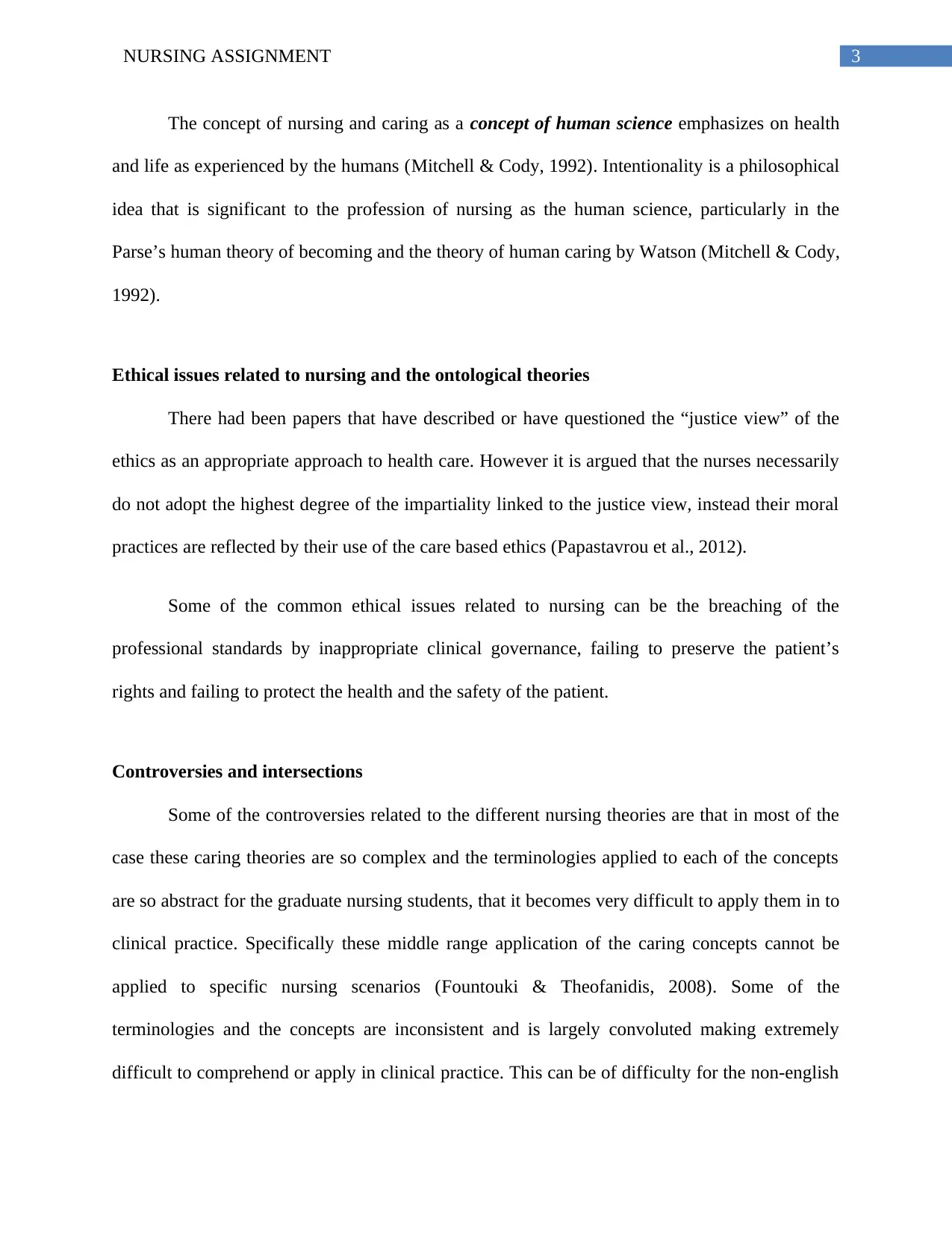
3NURSING ASSIGNMENT
The concept of nursing and caring as a concept of human science emphasizes on health
and life as experienced by the humans (Mitchell & Cody, 1992). Intentionality is a philosophical
idea that is significant to the profession of nursing as the human science, particularly in the
Parse’s human theory of becoming and the theory of human caring by Watson (Mitchell & Cody,
1992).
Ethical issues related to nursing and the ontological theories
There had been papers that have described or have questioned the “justice view” of the
ethics as an appropriate approach to health care. However it is argued that the nurses necessarily
do not adopt the highest degree of the impartiality linked to the justice view, instead their moral
practices are reflected by their use of the care based ethics (Papastavrou et al., 2012).
Some of the common ethical issues related to nursing can be the breaching of the
professional standards by inappropriate clinical governance, failing to preserve the patient’s
rights and failing to protect the health and the safety of the patient.
Controversies and intersections
Some of the controversies related to the different nursing theories are that in most of the
case these caring theories are so complex and the terminologies applied to each of the concepts
are so abstract for the graduate nursing students, that it becomes very difficult to apply them in to
clinical practice. Specifically these middle range application of the caring concepts cannot be
applied to specific nursing scenarios (Fountouki & Theofanidis, 2008). Some of the
terminologies and the concepts are inconsistent and is largely convoluted making extremely
difficult to comprehend or apply in clinical practice. This can be of difficulty for the non-english
The concept of nursing and caring as a concept of human science emphasizes on health
and life as experienced by the humans (Mitchell & Cody, 1992). Intentionality is a philosophical
idea that is significant to the profession of nursing as the human science, particularly in the
Parse’s human theory of becoming and the theory of human caring by Watson (Mitchell & Cody,
1992).
Ethical issues related to nursing and the ontological theories
There had been papers that have described or have questioned the “justice view” of the
ethics as an appropriate approach to health care. However it is argued that the nurses necessarily
do not adopt the highest degree of the impartiality linked to the justice view, instead their moral
practices are reflected by their use of the care based ethics (Papastavrou et al., 2012).
Some of the common ethical issues related to nursing can be the breaching of the
professional standards by inappropriate clinical governance, failing to preserve the patient’s
rights and failing to protect the health and the safety of the patient.
Controversies and intersections
Some of the controversies related to the different nursing theories are that in most of the
case these caring theories are so complex and the terminologies applied to each of the concepts
are so abstract for the graduate nursing students, that it becomes very difficult to apply them in to
clinical practice. Specifically these middle range application of the caring concepts cannot be
applied to specific nursing scenarios (Fountouki & Theofanidis, 2008). Some of the
terminologies and the concepts are inconsistent and is largely convoluted making extremely
difficult to comprehend or apply in clinical practice. This can be of difficulty for the non-english
Paraphrase This Document
Need a fresh take? Get an instant paraphrase of this document with our AI Paraphraser
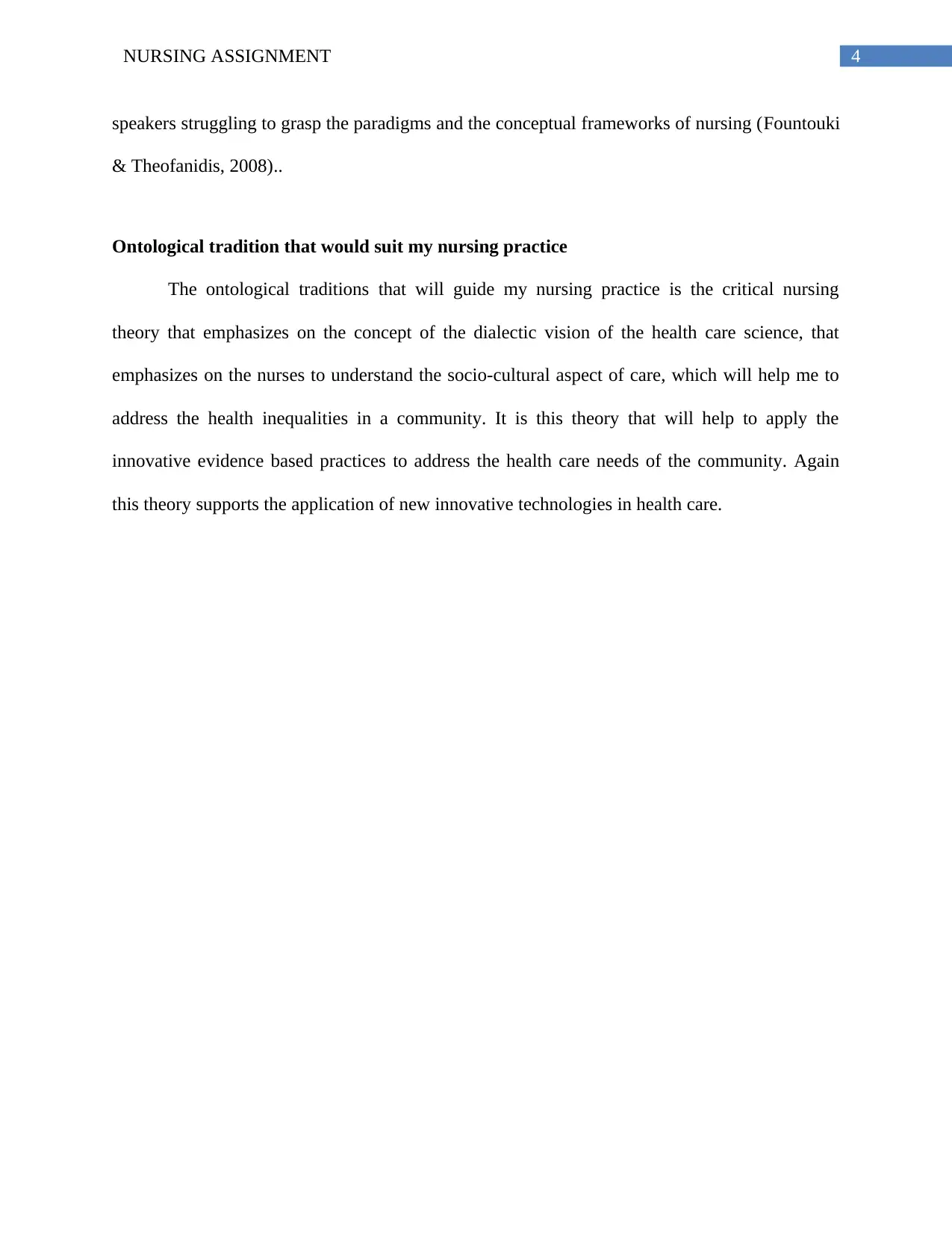
4NURSING ASSIGNMENT
speakers struggling to grasp the paradigms and the conceptual frameworks of nursing (Fountouki
& Theofanidis, 2008)..
Ontological tradition that would suit my nursing practice
The ontological traditions that will guide my nursing practice is the critical nursing
theory that emphasizes on the concept of the dialectic vision of the health care science, that
emphasizes on the nurses to understand the socio-cultural aspect of care, which will help me to
address the health inequalities in a community. It is this theory that will help to apply the
innovative evidence based practices to address the health care needs of the community. Again
this theory supports the application of new innovative technologies in health care.
speakers struggling to grasp the paradigms and the conceptual frameworks of nursing (Fountouki
& Theofanidis, 2008)..
Ontological tradition that would suit my nursing practice
The ontological traditions that will guide my nursing practice is the critical nursing
theory that emphasizes on the concept of the dialectic vision of the health care science, that
emphasizes on the nurses to understand the socio-cultural aspect of care, which will help me to
address the health inequalities in a community. It is this theory that will help to apply the
innovative evidence based practices to address the health care needs of the community. Again
this theory supports the application of new innovative technologies in health care.
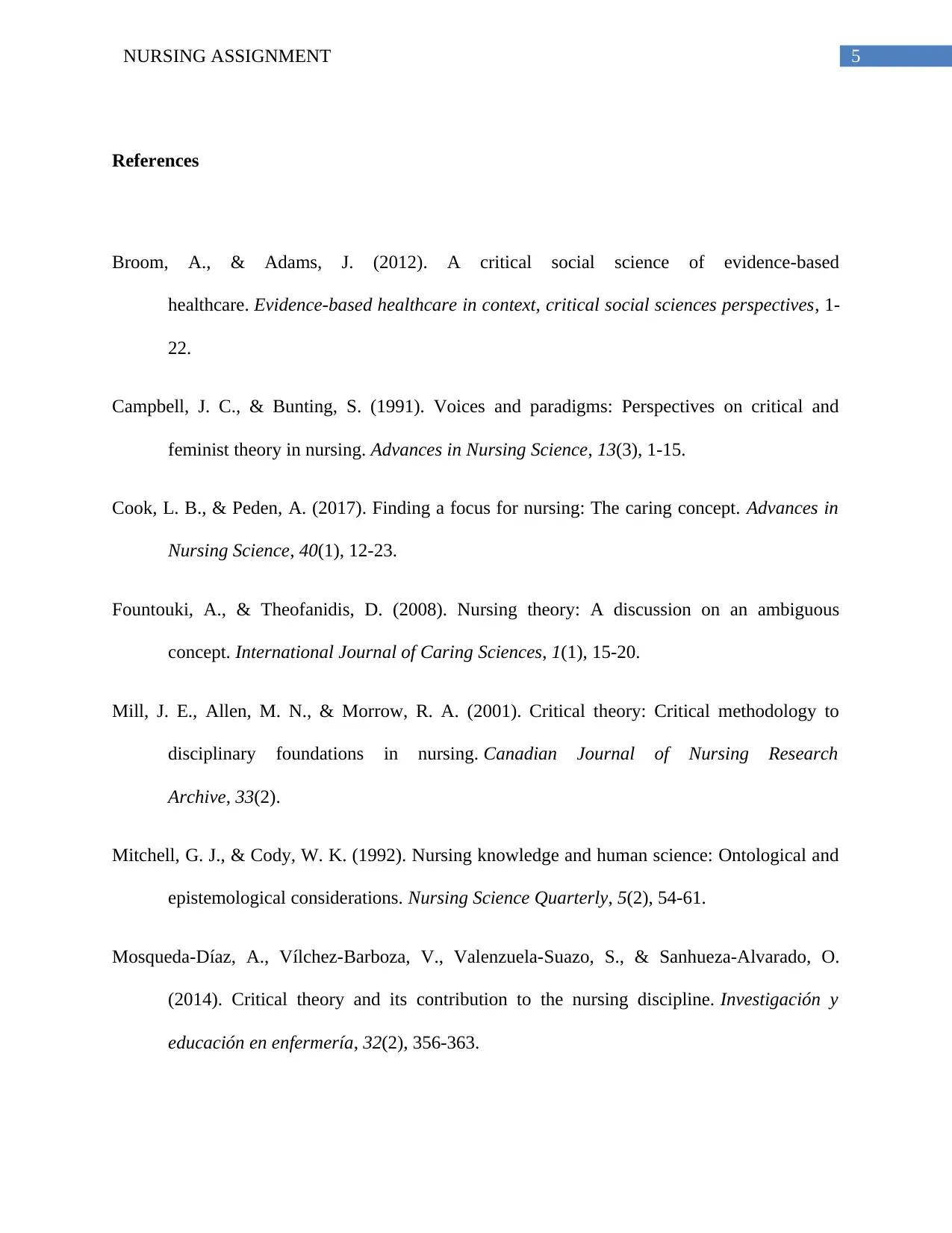
5NURSING ASSIGNMENT
References
Broom, A., & Adams, J. (2012). A critical social science of evidence-based
healthcare. Evidence-based healthcare in context, critical social sciences perspectives, 1-
22.
Campbell, J. C., & Bunting, S. (1991). Voices and paradigms: Perspectives on critical and
feminist theory in nursing. Advances in Nursing Science, 13(3), 1-15.
Cook, L. B., & Peden, A. (2017). Finding a focus for nursing: The caring concept. Advances in
Nursing Science, 40(1), 12-23.
Fountouki, A., & Theofanidis, D. (2008). Nursing theory: A discussion on an ambiguous
concept. International Journal of Caring Sciences, 1(1), 15-20.
Mill, J. E., Allen, M. N., & Morrow, R. A. (2001). Critical theory: Critical methodology to
disciplinary foundations in nursing. Canadian Journal of Nursing Research
Archive, 33(2).
Mitchell, G. J., & Cody, W. K. (1992). Nursing knowledge and human science: Ontological and
epistemological considerations. Nursing Science Quarterly, 5(2), 54-61.
Mosqueda-Díaz, A., Vílchez-Barboza, V., Valenzuela-Suazo, S., & Sanhueza-Alvarado, O.
(2014). Critical theory and its contribution to the nursing discipline. Investigación y
educación en enfermería, 32(2), 356-363.
References
Broom, A., & Adams, J. (2012). A critical social science of evidence-based
healthcare. Evidence-based healthcare in context, critical social sciences perspectives, 1-
22.
Campbell, J. C., & Bunting, S. (1991). Voices and paradigms: Perspectives on critical and
feminist theory in nursing. Advances in Nursing Science, 13(3), 1-15.
Cook, L. B., & Peden, A. (2017). Finding a focus for nursing: The caring concept. Advances in
Nursing Science, 40(1), 12-23.
Fountouki, A., & Theofanidis, D. (2008). Nursing theory: A discussion on an ambiguous
concept. International Journal of Caring Sciences, 1(1), 15-20.
Mill, J. E., Allen, M. N., & Morrow, R. A. (2001). Critical theory: Critical methodology to
disciplinary foundations in nursing. Canadian Journal of Nursing Research
Archive, 33(2).
Mitchell, G. J., & Cody, W. K. (1992). Nursing knowledge and human science: Ontological and
epistemological considerations. Nursing Science Quarterly, 5(2), 54-61.
Mosqueda-Díaz, A., Vílchez-Barboza, V., Valenzuela-Suazo, S., & Sanhueza-Alvarado, O.
(2014). Critical theory and its contribution to the nursing discipline. Investigación y
educación en enfermería, 32(2), 356-363.
⊘ This is a preview!⊘
Do you want full access?
Subscribe today to unlock all pages.

Trusted by 1+ million students worldwide

6NURSING ASSIGNMENT
Papastavrou, E., Efstathiou, G., Tsangari, H., Suhonen, R., Leino‐Kilpi, H., Patiraki, E., ... &
Jarosova, D. (2012). A cross‐cultural study of the concept of caring through behaviours:
patients’ and nurses’ perspectives in six different EU countries. Journal of advanced
nursing, 68(5), 1026-1037.
Ray, M. A., & Turkel, M. C. (2014). Caring as emancipatory nursing praxis: The theory of
relational caring complexity. Advances in Nursing Science, 37(2), 132-146.
Papastavrou, E., Efstathiou, G., Tsangari, H., Suhonen, R., Leino‐Kilpi, H., Patiraki, E., ... &
Jarosova, D. (2012). A cross‐cultural study of the concept of caring through behaviours:
patients’ and nurses’ perspectives in six different EU countries. Journal of advanced
nursing, 68(5), 1026-1037.
Ray, M. A., & Turkel, M. C. (2014). Caring as emancipatory nursing praxis: The theory of
relational caring complexity. Advances in Nursing Science, 37(2), 132-146.
1 out of 7
Related Documents
Your All-in-One AI-Powered Toolkit for Academic Success.
+13062052269
info@desklib.com
Available 24*7 on WhatsApp / Email
![[object Object]](/_next/static/media/star-bottom.7253800d.svg)
Unlock your academic potential
Copyright © 2020–2026 A2Z Services. All Rights Reserved. Developed and managed by ZUCOL.





